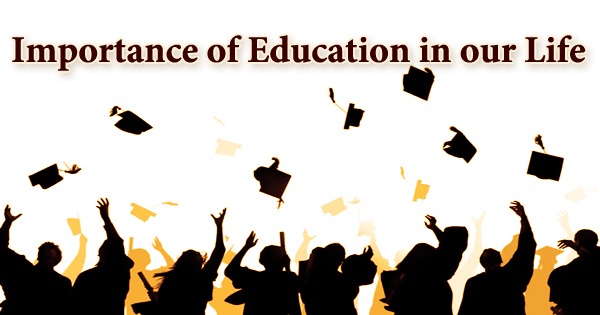Education is a tool that provides people with knowledge, ability, technique, and information, as well as allowing them to understand their rights and responsibilities toward their families, community, and nation. It broadens one’s perspective and outlook on life. It improves people’s abilities to combat inequality, crime, corruption, and a variety of other negative aspects of society. Any person without an education is like a hawk with its wings clipped; education gives us wings to fly and explore, allowing us to be optimistic and opportunistic. Education is a powerful tool that can be used to face life’s challenges and conquer poverty, fear, and status in order to achieve success. We gain awareness of the world around us through education. It cultivates in us a way of looking at life. It is the most crucial aspect of the country’s growth. One cannot pursue new ideas without education. It implies that one would be unable to improve the world because without ideas, there is no innovation, and without creativity, there is no nation-building. People argue over whether schooling is the only means of acquiring knowledge. Some people believe that education is the process of acquiring awareness about the world around them, while knowledge is something entirely different. They’re right. However, without education, information cannot be translated into knowledge. Education, among other things, equips us with the ability to interpret information. It’s not all about textbook classes. It’s all about life’s lessons. Without education, life becomes a race that we will never win, no matter how hard we try or how brave we are; it is only then that we know that education is the only way to achieve life success. Education is the rung on which we must ascend to get to where we want to go, to make our aspirations a reality; today, only because we are trained, we walk with pride and aim to accomplish the seemingly impossible. Individuals are formed by education, and educated individuals form better communities, which form great nations. From the least developed third-world countries (like Togo and Madagascar) to the world’s superpowers (USA, Russia, China), education and offering compulsory education to everyone is their only hope for prosperity and growth. In today’s developed world, education is a vital factor that plays a significant role. To succeed in today’s competitive world, people need a good education. People with high living standards and expertise are the foundation of modern society, allowing them to apply better solutions to their problems. Education aids in the eradication of poverty because a trained person can obtain a good job and meet all of his family’s basic needs and requirements. If an individual is well-educated, he will not easily be duped by others. To live a healthy and stable life, one must recognize the importance of education in our everyday lives.
Early childhood education usually refers to all of a child’s education up until the age of eight, or around third grade. Children’s brains are rising and learning at a rapid pace during these early years of development, and learning comes naturally to them. At this age, the aim of education is to lay a strong foundation for children to build on for the rest of their lives. A decent education entails more than merely attending school or college and earning a diploma. The country’s trade and industry will prosper more easily if its people are well-educated. Education aids in the development of self-reliance and a high level of trust in the ability to complete challenging tasks. Education has the power to change a country’s destiny; a country with trained and qualified citizens is more likely to achieve its desired economic growth and become a developed country. A well-educated country effectively overcomes any obstacles to its progress and aims for long-term development. Training also contributes to women’s empowerment. With the power of education, old traditions such as not remarrying widows, child marriage, and the dowry system can be abolished. Women who are knowledgeable will speak out about injustices that have been done to them. This will have a significant impact on society and the nation. In comparison to developed countries, developing countries have a weak law and order situation. Poverty breeds illiteracy, and poverty breeds violence. Education would reintegrate these misguided youngsters and adults into society, thus improving the law-and-order situation. An illiterate person is more likely to accept deceptive traditions and orthodox customs than a literate person. Training, on the other hand, can alter a person’s perception of caste discrimination, making him more likely to be caste neutral and egalitarian, and willing to contribute productively to the country. As a result, education will ultimately eliminate casteism; the more people who are taught, the more caste neutral the country becomes. The most critical ingredient in changing the world is education. Many illiterate people face bigotry, untouchability, and other social injustices as a result of their lack of education, but with the advancement of a decent education, these problems can be alleviated. A well-educated person has the confidence to confront or deliver a speech in front of a wide audience, or to hold a conference or seminar. Without a basic education, it is impossible to write emails, letters, type notes, read magazines and newspapers, or even use a Smartphone. Gender equity is instilled in education, which is critical for a country’s development. Any country cannot advance if one or more genders are left behind. If we are to achieve growth, we must educate our youth, especially girls and women, so that they can break free from gender discrimination and contribute constructively to the nation’s progress. One of the most significant advantages of education is that it enhances people’s lives while also assisting society’s smooth operation. Poverty can be alleviated by providing education, and everyone can contribute to the country’s growth. As a result, an educated, well-cultured, and progressive community represents a progressive nation with satisfied and contented students. A society can only be happy and democratic if it is able to break free from the shackles of poverty, unemployment, injustice, corruption, gender inequality, and economic disparities, among other things, by ensuring that all of its people are literate and that compulsory education is given to all. Education is the most important tool we have to alter people’s perceptions of the world. A well-educated person knows how to deal with a variety of issues. An individual may build good moral values with the right education. It assists us in being better human beings.
















